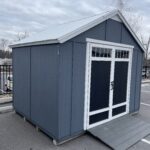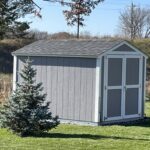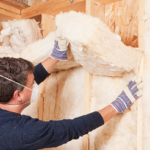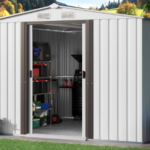Is it time to put away your lawnmower for the season? You want to be sure it’s stored correctly, whether that’s in your shed or in your garage! Never leave it out in the open – it could get damaged by winter weather or even stolen.
However, if you don’t currently have a shed or garage, where are you going to store your lawnmower? We recommend purchasing a shed that can accommodate your equipment – and that depends on the size of the lawnmower (plus any additional space you need for other items).
We review below a few different sizes of sheds that can fit your various needs, plus provide some pros and cons of each.
6×8 Sheds

6×8 sheds are typical garden sheds and can’t fit quite a lot. However, they are perfect for smaller items, gardening equipment, and a smaller lawnmower. If you take the right approach to organization, they can be perfect for backyards and storage needs.
Pros of a 6×8 Shed
• Potentially, a smaller shed will help you stay more organized as fewer items can fit inside.
• More affordable
• Easy to care for
• Easy to build
• Simple to obtain permits for
Cons of a 6×8 Shed
• Doesn’t have plenty of space for more intense hobbyists
• Cramped and confined
• If you have too much stuff, getting an item you need out of the shed can be an adventure
8×12 Sheds

8×12 sheds may not be quite as common as 6×8, but they can be a great size for those who need a bit more space. Organization is easier than ever and plenty can fit inside – so they’re an excellent option for gardeners and many lawnmowers.
Pros of an 8×12 Shed
• They have more capacity
• Can still fit in many backyards – not too small, not too big, perfect for Goldilocks!
• Fewer need for wallmounts and containers to optimize the space
With the right wall height, an 8×12 shed is about the size where putting a shed loft in for extra storage makes sense.
Cons of an 8×12 Shed
• Still not quite large enough for larger lawnmowers and other equipment
• Might not provide enough space for woodworkers and the like
• More expensive than smaller sheds
10×14 Sheds

If you need space for your hobby and your lawnmower, the 10×14 shed can be an excellent option. With plenty of space, you don’t have to worry about knocking things over and you can even add a workbench.
Pros of a 10×14 Shed
• Plenty of space for hobbyists, lawnmowers, and other equipment
• Can fit just about any lawnmower
• Can be perfect for other storage needs, especially for homes that don’t have attics or basements
Cons of a 10×14 Shed
• They may be too big for some properties or backyards
• Expensive to build and maintain
• Might be too much shed for some gardeners
12×20 Sheds

Want to go even larger than a 10×14 shed? Here comes the 12×20 then! This option is HUGE, so many homeowners may simply not have the space on their property to install it. However, if you have quite a few hobbies (or all your family members have different ones), this shed may be just what you need to have space for all of them plus that lawnmower.
Pros of a 12×20 Shed
• Largest recommended size for most homeowners
• There’s plenty of room for activities and to move around
• Several workbenches can be added
• Will fit any lawnmower
Cons of a 12×20 Shed
• These can get very expensive
• May not fit in your backyard or take up almost all of the space available
• Very likely requires permits and permission in some areas
Deciding what shed size to go with may be a clear cut decision for many homeowners, especially if you only have so much yard space to work with. For most that need storage space for their lawnmower, a 6×8 shed or 8×12 shed will do the trick. They’re more inexpensive than the other options, and if you don’t have any activities that you need shed space for, they’re just what you need. However, we recommend weighing the pros and cons of each – plus give thought to your hobbies – before making a decision!
Do I need a permit to build a lawnmower shed?
Many people are unclear on the permit process for building a lawnmower or garden shed. It can be confusing, because the rules are all local. They can change from city to city, and in many cases, if you are in a rural or unincorporated area, the rules may not exist (or may only govern safety codes).
It is best to check with your municipality on shed restrictions and permitting needs. These rules are all local.
A few things that are often address in the municipal code when it comes to sheds:
- How large can the shed be?
- How many sheds can one property have?
- Does the shed require any safety features or specific building techniques to build it per code?
- How far from the lot line (border of your property) does the shed need to be?
- In some cases, rare, rules may also govern the design or color of a shed












